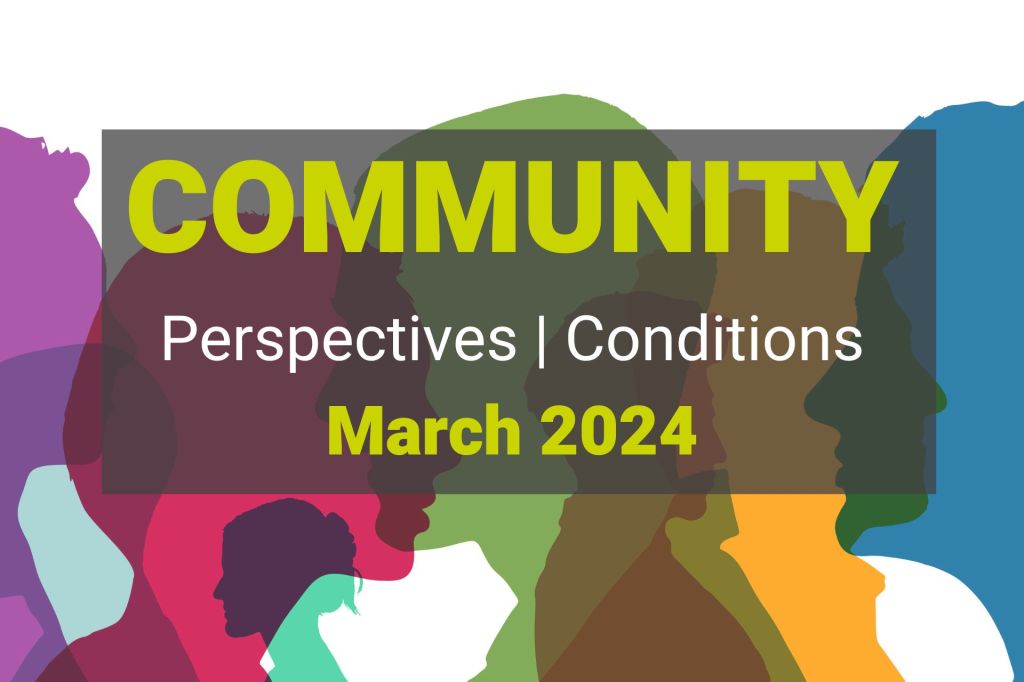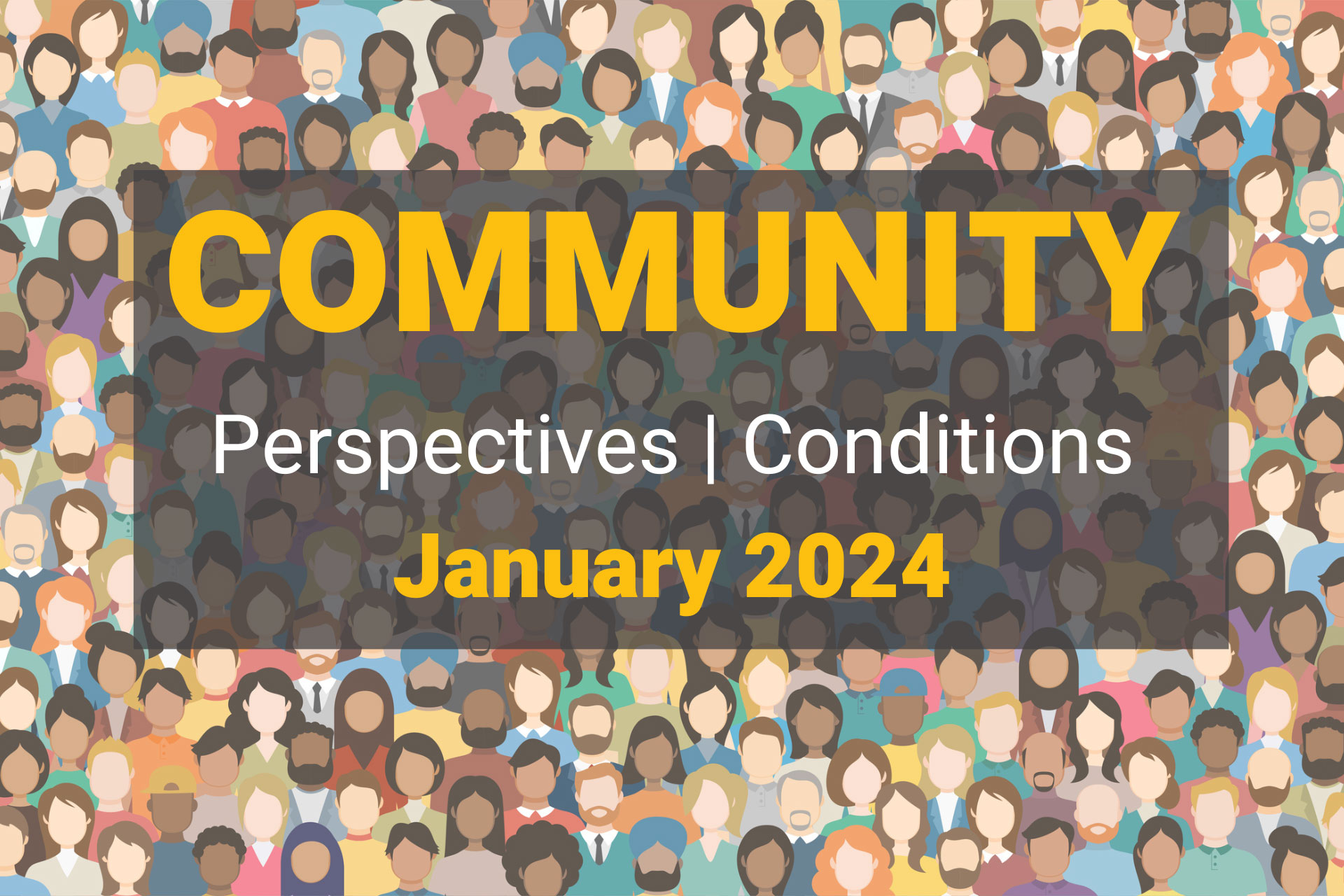Federal Reserve Banks across the country collect anecdotes from contacts and hone in on concerns for Federal Reserve Beige Book summaries, published eight times each year. Historically, insights about conditions affecting low- and moderate-income communities have come from the perspective of businesses. Several Reserve Banks began including “Community Conditions” and “Community Perspectives” sections in the fall of 2022. These sections provide insight into local changes through direct accounts of nonprofit and community leaders and workforce professionals serving lower-income people. Here are some takeaways from the March 2024 Beige Book, which was prepared at the Federal Reserve Bank of San Francisco and based on information collected on or before February 26, 2024.
Please note that the Beige Book summarizes comments received from contacts outside the Federal Reserve and is not a commentary on the views of Federal Reserve officials.
“Community leaders expressed concern about crime and public safety. Although violent crime rates have continued to decline over the past year, a rise in hate crimes and ongoing high rates of retail theft have reduced the sense of security in public spaces, such as on public transit and in stores. Retail theft has taken a particular toll on small business owners, who faced increased costs due to loss prevention measures. Legislators have worked to respond to this problem, with proposals including a tax rebate for shop owners to ease the costs of additional security and loss prevention measures.”
– New York Fed, Federal Reserve 2nd District, Community Perspectives
“Several workforce development contacts reported increased demand for their services over the past few months, with some noting that their client composition included more immigrants and non-English speakers. Most individuals sought training for occupations in health care or to obtain commercial driver’s licenses. However, one contact noted that younger workers were gravitating to gig work or other self-employment, even after completing training for other jobs. Contacts noted that federal infrastructure initiatives in Ohio increased employers’ demand for training geared toward broadband infrastructure, robotics, cybersecurity, and skilled trades. Several contacts said that access to transportation and quality childcare continued to be barriers for job seekers in obtaining and retaining employment.”
– Cleveland Fed, Federal Reserve 4th District, Community Conditions
“The discontinuation of pandemic-era programs, such as enhanced SNAP and child tax credit programs, emergency rental assistance, and extended Medicaid coverage—compounded by rising prices—continued to weigh heavily on many households. Housing expenses remained an acute burden for both consumers and providers of affordable housing. Consumer-facing business contacts noted that low- and moderate-income consumers shifted spending to less expensive items and sought extended payment options. Social service organizations reported heightened demand for food and housing assistance; most reported sufficient funding to help meet the increased demand for services. Local government and nonprofit representatives reported strong demand for skilled labor, while citing insufficient training as an obstacle for local jobseekers looking for employment in higher-wage occupations.”
– Atlanta Fed, Federal Reserve 6th District, Community Perspectives
“Community and nonprofit contacts saw a modest increase in economic activity over the reporting period. State government officials continued to see healthy growth in tax revenues and low demand for unemployment insurance. However, there were signs of a deterioration in prospects for small businesses. Small business development organizations noted that requests for support had shifted away from start-ups and toward existing businesses as some businesses launched during the pandemic struggled with sustainability. Community Development Financial Institutions reported increased demand for working capital loans from businesses finding it difficult to obtain financing from banks. Nonprofits supporting households noted clients were increasingly relying on credit cards and that the financial position some prospective homebuyers had worsened because of the recent resumption of student loan repayments. Social service organizations indicated that despite lower inflation, high price levels for many household items were still an important concern for low-income consumers.”
– Chicago Fed, Federal Reserve 7th District, Community Conditions
“More contacts reported difficulties among low-to-moderate income (LMI) households in obtaining and maintaining affordable credit. Contacts noted increased utilization of, and defaults on, credit cards, payday loans, and pay-as-you-go purchasing among LMI households. Defaults on debts for medical services also reportedly rose. The increase in default rates among LMI households has led to a moderate increase in challenges among renters in qualifying for housing leases. Contacts also reported more denials of financing for car purchases among LMI households and a slight increase in vehicle repossession due to delinquency on existing loans.”
– Kansas City Fed, Federal Reserve 10th District, Community Conditions
“Nonprofits reported continued elevated demand for services, as lower-income households faced increased difficulty in making ends meet. There were also reports of an uptick in white-collar professionals seeking financial assistance. Housing affordability remained a widespread concern, and contacts said in some instances multiple generations were living together in order to pay for housing costs. Contacts said that along the Texas-Mexico border, there was a need for migrant housing beyond the temporary assistance provided by FEMA. Mental health was cited as a growing need among youth.”
– Dallas Fed, Federal Reserve 11th District, Community Perspectives
“Demand for community support and services remained high. Households and other community members sought support for childcare, rental assistance, affordable housing, food assistance, and mental health services. Nonprofit organizations reported a drop in charitable donations, which further constrained meeting the community’s elevated demand for basic needs. Reports highlighted difficulties by small businesses across the District, particularly in rural areas, to access credit. A few contacts in Hawaii mentioned ongoing challenges, such as housing instability, and the long-term impacts facing the communities displaced by last year’s wildfires in Maui.”
– San Francisco Fed, Federal Reserve 12th District, Community Conditions
Visit the March 2024 Beige Book report for a full national summary and more information about economic conditions from each Reserve Bank, including labor markets, financial services, real estate, and more.









